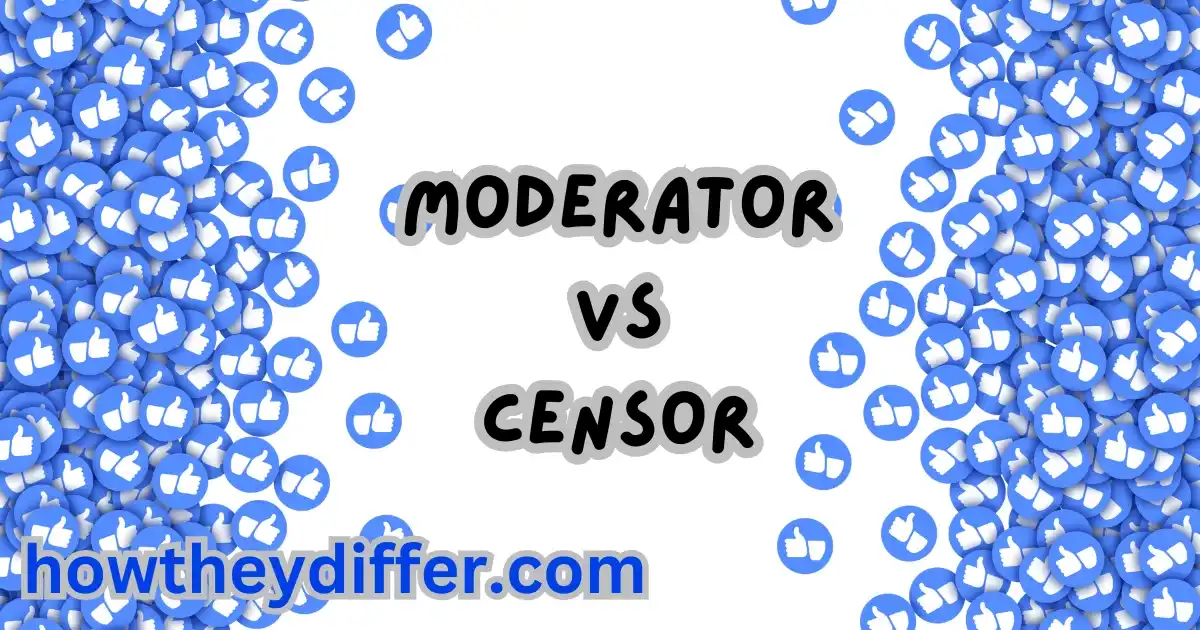Have you ever wondered who keeps online discussions on track? Or who decides what you can and cannot see on the internet? You often hear about moderators and censors, but what exactly do they do? While these terms are sometimes used interchangeably, they have distinct roles and responsibilities.
Understanding the difference between a moderator and a censor is important because it helps us understand how information is managed and shared, both online and in the real world. Think of it like this: a moderator is like a referee in a game, making sure everyone plays fair and follows the rules. A censor, on the other hand, is more like a librarian who decides which books you can access.
In this article, we’ll break down the differences between these two roles, looking at their purposes, methods, and the impact they have on our access to information. By the end, you’ll have a clear understanding of what sets moderators and censors apart.
Moderator and Censor: Defining the Roles
Let’s start by defining what moderator and censor means:
What is a Moderator?
A moderator is someone who oversees a discussion or community to ensure it stays productive, respectful, and on topic. They act like guides, facilitating communication and ensuring everyone follows the established rules.
Think of a moderator like the teacher in a classroom. They keep things organized, encourage participation, and make sure everyone has a chance to speak.
What is a Censor?
A censor is someone who examines content and removes or suppresses anything they deem objectionable or inappropriate. They act as a filter, controlling what information is available to the audience.
Imagine a censor as a movie editor who cuts out scenes they think are unsuitable for viewers.
Moderator and Censor: Major Differences
While both moderators and censors play a role in managing information, their approaches and goals are quite different. Here’s a breakdown of the key distinctions:
Table 1: Comparing Moderator and Censor
| Feature | Moderator | Censor |
|---|---|---|
| Purpose | To facilitate healthy discussion and ensure community guidelines are followed | To control information and suppress content deemed inappropriate or harmful |
| Focus | Maintaining order and encouraging productive interaction | Restricting access to certain types of content |
| Methods | Setting clear rules, guiding discussions, removing disruptive content | Examining content, removing or blocking access to objectionable material |
| Approach | Generally transparent and focused on maintaining a positive environment | Can be secretive and subjective, often based on specific values or beliefs |
| Impact | Creates a safe space for sharing ideas and opinions | Limits exposure to certain ideas and perspectives |
Difference Between Moderator and Censor in Action?
To further illustrate the difference, let’s look at some examples:
- Online Forums: A moderator might remove a comment that is offensive or off-topic, while a censor might block an entire thread about a controversial subject.
- Video Games: A moderator might mute a player who is using abusive language, while a censor might remove a particular weapon or character from the game.
- Movies: A moderator (in this case, a ratings board) might assign a movie an age rating based on its content, while a censor might cut out specific scenes or ban the movie altogether.
The Importance of Context
It’s important to remember that the line between moderation and censorship can sometimes be blurry. The specific actions of a moderator or censor can vary depending on the context and the specific rules or guidelines in place.
For example, a moderator in a school setting might have stricter rules about language and content than a moderator in an online gaming community. Similarly, censorship laws in one country might be different from those in another.
Conclusion
While both moderators and censors influence the information we access, their roles and methods are distinct.
Moderators act as facilitators, guiding discussions and ensuring fair play, while censors act as filters, controlling the availability of content. Understanding these differences is crucial for navigating the flow of information in our increasingly connected world.
By recognizing the roles of moderators and censors, we can better understand the forces that shape our access to information and engage more critically with the content we consume.
FAQs
Some of the frequently inquired questions about differences between moderator and censor are given as:
What are some examples of content that a censor might remove?
Censors might remove content that is considered violent, sexually explicit, hateful, or politically sensitive. The specific criteria for censorship vary depending on the context and the values of the censoring body.
Is censorship always a bad thing?
Censorship can be a complex issue. While it can be used to protect people from harmful content, it can also be used to suppress dissenting opinions or limit freedom of expression.
Who decides what a moderator can and cannot do?
The rules and guidelines for moderators are usually set by the community or platform they oversee. In some cases, there might be legal or regulatory frameworks that influence moderation practices.
Are there different types of moderation?
Yes, there are various approaches to moderation. Some moderators take a more hands-off approach, only intervening when necessary, while others are more proactive in shaping discussions.
Can I become a moderator or a censor?
Many online communities and platforms rely on volunteer moderators. If you’re interested in becoming a moderator, you can often apply for the role or be nominated by other community members. Censorship roles, on the other hand, are typically found in government agencies, media organizations, or other institutions responsible for regulating content.
